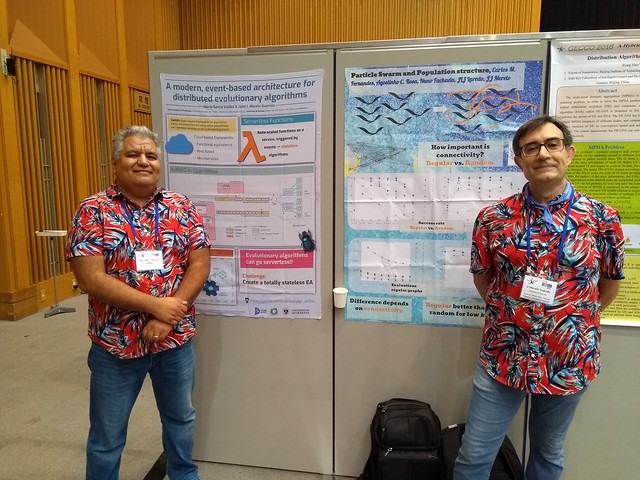Last week I presented at IEEE CIG 2018 (held in Maastricht, The Netherlands) our following step in our research about autonomous drivers for Car Racing Simulators, such as TORCS, titled «The Evolutionary Race: Improving the Process of Evaluating Car Controllers in Racing Simulators«.
As commented before by @jjmerelo and later by @fergunet, we designed with Mohammed Salem (University of Mascara) a driver’s AI in which two Fuzzy Subcontrollers were hybridized with a Genetic Algorithm.
In this work we present a better evaluation approach for the GA, combining three methods: heuristic track choosing, improved fitness functions, and race-based selection of the best.
The abstract of the work is:
Simulated car races have been used for a long time as an environment where car controlling algorithms can be tested; they are an interesting testbed for all kinds of algorithms, including metaheuristics such as evolutionary algorithms. However, the challenge in the evolutionary algorithms is to design a reliable and effective evaluation process for the individuals that eventually translates into good solutions to the car racing problem: finding a controller that is able to win in a wide range of tracks and with a good quantity of opponents. Evaluating individual car controllers involves not only the design of a proper fitness function representing how good the car controller would be in a competitive race, but also the selection of the best solution for the optimization problem being solved; this decision might not be easy when uncertainty is present in the problem environment; in this case, weather and track conditions as well as unpredictable behavior of other drivers. Creating a methodology for the automatic design of the controller of an autonomous driver for a car racing simulator such as TORCS is an optimization problem which offers all these challenges. Thus, in this paper we describe an analysis and some proposals to improve the evaluation of optimized fuzzy drivers for TORCS over previous attempts to do so. It builds on preliminary results obtained in previous papers as a baseline and aims to obtain a more competitive autonomous driver via redesign of the fitness evaluation procedure; to this end, two different fitness functions are studied in several experiments, along with a novel race-based approach for the selection of the best individual in the evolution.
And the presentation is:
You can check our paper in the proceedings of the conference.
Enjoy it!
(And cite us as usual :D)
